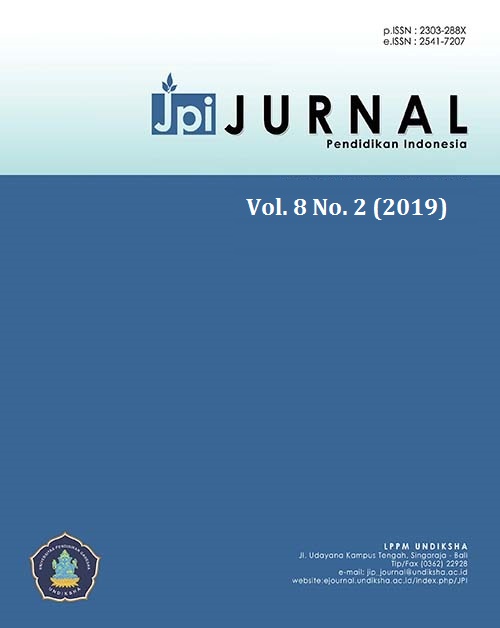Contextual Learning on Mathematical Subjects to Enhance Student Motivation for Learning in Vocational High School
DOI:
https://doi.org/10.23887/jpi-undiksha.v8i2.13499Keywords:
contextual learning, learning motivation, vocational studentsAbstract
The problem of learning in mathematics is because students always look at mathematics is difficult and usually exacerbated by the use of minimal learning aids. It needs to be given a fun learning solution for students to have the motivation and willingness to learn mathematics. One of them is contextual learning. This research wants to see the extent to which contextual learning is able to improve student learning motivation. This study uses qualitative research with the type of action research class (PTK) using the implementation cycle to see increased motivation and student learning outcomes. The results showed an increase in the motivation percentage of learning to study as a whole for each indicator of the I cycle of 62, 89% to 73.42% motivation to study in cycle II for learning outcomes experienced Increase in high category with gain Sebsar 0.71. Based on the data it has been noted that with contextual learning it is able to improve student motivation and learning outcomes.
References
Ali, M. (2010). Guru Dalam Proses Belajar Mengajar (14th ed.). Sinar Baru Algensindo.
Aryanti. (2018). Peranan Guru Dalam Meningkatkan Motivasi Belajar Siswa. Didaktika Jurnal Kependidikan, 12(2), 117–134. https://doi.org/10.30863/didaktika.v12i2.181
Ayan, J. E. (2002). No TitleBengkel kreativitas: 10 cara menemukan ide-ide pamungkas melalui pergaulan, lingkungan, perjalanan, permainan, alam bawah sadar, seni, teknologi, berpikir, bacaan, jiwa kreatif (1st ed.). Bandung: Kaifa. Retrieved from http://uilis.unsyiah.ac.id/uilis/index.php?p=show_detail&id=8289
Bustami, Y., Syafruddin, D., & Afriani, R. (2018). The implementation of contextual learning to enhance biology students’ critical thinking skills. Jurnal Pendidikan IPA Indonesia, 7(4), 451–457. https://doi.org/10.15294/jpii.v7i4.11721.
Depdiknas. (2003). Kurikulumberbasis Kompetensi. Jakarta: Pusat Kurikulum, Balitbang Depdiknas.
Januzewski, A. and M. M. (2009). Educational Technology: A Definition with Commentary. British Journal of Educational Technology, 40(1), 185–195. https://doi.org/10.1111/j.1467-8535.2008.00925_4.x
Kadir, A. (2013). Konsep pembelajaran kontekstual di sekolah. Dinamika Ilmu, 13(3), 17–38. https://doi.org/10.21093/di.v13i1.20
Kompri. (2015). Motivasi Pembelajaran Perspektif Guru dan Siswa (1st ed.). Bandung: PT Remaja Rosdakarya. Retrieved from https://rosda.co.id/pendidikan-keguruan/494-motivasi-pembelajaran-perspektif-guru-dan-siswa.html
Lin, J. J. H., & Lin, S. S. J. (2014). Cognitive Load For Configuration Comprehension In Computer-Supported Geometry Problem Solving: An Eye Movement Perspective. International Journal of Science and Mathematics Education, 12(3), 605–627. https://doi.org/10.1007/s10763-013-9479-8
Maja, I. (2013). Pengaruh Motivasi, Metode Pembelajaran Dan Disiplin Belajar Terhadap Prestasi Belajar Matematika Teknik Di Politeknik Negeri Sriwijaya. Jurnal Orasi Bisnis, IX(Mei), 34–47.
Maryati, I. (2017). Peningkatan Kemampuan Penalaran Statistis Siswa Sekolah Menengah Pertama Melalui Pembelajaran Kontekstual. Jurnal Mosharafa, 6(1), 129–140. https://doi.org/10.31980/mosharafa.v6i1
Saha, R. A., Ayub, A. F. M., & Tarmizi, R. A. (2010). The effects of GeoGebra on mathematics achievement: Enlightening Coordinate Geometry learning. In Procedia - Social and Behavioral Sciences (Vol. 8, pp. 686–693). https://doi.org/10.1016/j.sbspro.2010.12.095
Smaldino, S. E., & Lowther, D. L. (2018). Instructional Technology and Media for Learning. (D. Kevin, Ed.) (12th ed.). Boston: Pearson Education, Inc.
Stephen Kemmis, Robin McTaggart, R. N. (2014). The Action Research Planner Doing Critical Participatory Action Research. Springer Singapore Heidelberg New York Dordrecht London: Springer Science+Business Media Singapore. https://doi.org/10.1007/978-981-4560-67-2
Syahbana, A. (2012). Peningkatan Kemampuan Berfikir Kritis Matematis Siswa SMP melalui Pendekatan Con. Edumatica: Jurnal Pendidikan Matematika, 02(1), 45–57. Retrieved from https://online-journal.unja.ac.id/index.php/edumatica/article/view/604
Triyono. (2018). Penelitian Tindakan Kelas : Apa Dan Bagaimana Melaksanakannya ? Seminar Guru-Guru se UPDT Sumpiuh, Banyumas. https://doi.org/10.13140/RG.2.2.26385.12649
Uno, H. B. (2011). Teori Motivasi dan Pengukurannya (15th ed.). Jakarta: Bumi Aksara.
Yohanes, B., Matematika, P., & Malang, P. N. (2016). Beban Kognitif Siswa Dalam Pembelajaran Materi Geometri. Jurnal Pendidikan - Teori, Penelitian, Dan Pengembangan, 1(2), 187–195. https://doi.org/10.17977/jp.v1i2.6121
Winter, N., & Fleenor, J. W. (2007). Effective Training: Systems, Strategies and Practices (3rd edition) by P. Nick Blanchard and James W. Thacker. Personnel Psychology, 60(4), 1077–1079. https://doi.org/10.1111/j.1744-6570.2007.00101_9.x
Downloads
Published
Issue
Section
License
Authors who publish with the Jurnal Pendidikan Indnesia agree to the following terms:
- Authors retain copyright and grant the journal the right of first publication with the work simultaneously licensed under a Creative Commons Attribution License (CC BY-SA 4.0) that allows others to share the work with an acknowledgment of the work's authorship and initial publication in this journal.
- Authors are able to enter into separate, additional contractual arrangements for the non-exclusive distribution of the journal's published version of the work (e.g., post it to an institutional repository or publish it in a book), with an acknowledgment of its initial publication in this journal.
- Authors are permitted and encouraged to post their work online (e.g., in institutional repositories or on their website) prior to and during the submission process, as it can lead to productive exchanges, as well as earlier and greater citation of published work. (See The Effect of Open Access)








